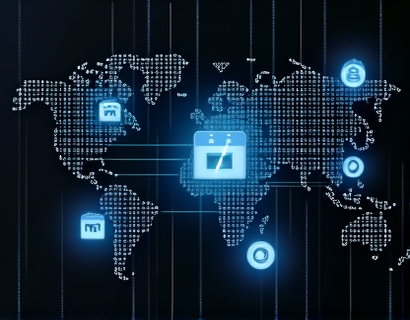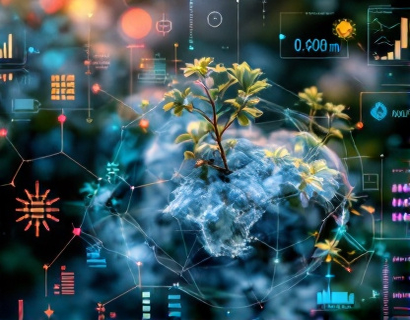Autonomous AI Agents: Streamlining Continuous Objectives for Business and Personal Productivity Boost
In the rapidly evolving landscape of business and personal productivity, the integration of Autonomous AI Agents stands out as a pivotal advancement. These intelligent systems are designed to operate independently, managing a wide array of tasks and objectives without human intervention. By doing so, they enable businesses and individuals to focus on their core activities, thereby gaining a significant competitive edge. This article delves into the transformative impact of AI-driven solutions on process streamlining and efficiency enhancement, providing practical strategies for maximizing productivity in a fast-paced environment.
The concept of Autonomous AI Agents is rooted in the broader field of Artificial Intelligence, specifically in the subfield of Autonomous Systems. These agents are programmed to perform tasks that traditionally required human input, but with the added capability of learning and adapting to new situations. The primary goal is to automate repetitive and time-consuming tasks, allowing users to allocate their time and resources more effectively.
Understanding Autonomous AI Agents
To fully appreciate the benefits of Autonomous AI Agents, it is essential to understand their core functionalities. These agents are equipped with advanced algorithms and machine learning models that enable them to process vast amounts of data, identify patterns, and make decisions. They can be deployed in various domains, from scheduling and project management to customer service and data analysis.
One of the key features of Autonomous AI Agents is their ability to operate continuously. Unlike human workers who require breaks and have limited working hours, these agents can work around the clock, ensuring that tasks are completed efficiently and promptly. This continuous operation is particularly beneficial for businesses that operate across multiple time zones or require round-the-clock monitoring.
Benefits for Businesses
For businesses, the integration of Autonomous AI Agents can lead to substantial improvements in productivity and operational efficiency. One of the most immediate benefits is the reduction in manual workload. Tasks such as data entry, report generation, and routine monitoring can be automated, freeing up employees to focus on higher-value activities that require human creativity and critical thinking.
Moreover, Autonomous AI Agents can significantly enhance decision-making processes. By analyzing large datasets and providing insights in real-time, these agents help businesses make informed decisions quickly. This is particularly valuable in dynamic markets where timely decisions can mean the difference between success and failure.
Case Study: Streamlining Project Management
Consider a large multinational corporation that manages multiple projects simultaneously. Traditionally, project managers spend a considerable amount of time on task allocation, progress tracking, and status reporting. By deploying Autonomous AI Agents, the company can automate these processes. The agents can dynamically assign tasks based on team availability and expertise, track progress in real-time, and generate comprehensive reports with minimal human intervention. This not only saves time but also reduces the risk of human error, leading to more accurate and efficient project management.
Benefits for Individuals
For individuals, Autonomous AI Agents can revolutionize personal productivity. In the modern workforce, the line between work and personal life often blurs, leading to burnout and decreased efficiency. By offloading routine and repetitive tasks to AI agents, individuals can reclaim their time and focus on activities that bring personal fulfillment and professional growth.
For example, managing a personal calendar, setting reminders, and organizing to-do lists can be automated. This allows individuals to maintain a structured and productive lifestyle without the constant need to manage these tasks manually. Additionally, AI agents can assist in financial planning, health monitoring, and even learning new skills by providing personalized recommendations and tracking progress.
Personal Productivity Tool: Task Management
Imagine using an AI agent to manage your daily tasks. In the morning, the agent reviews your calendar and to-do list, prioritizing tasks based on urgency and importance. It sends reminders and notifications to ensure you stay on track throughout the day. As the day progresses, the agent adjusts priorities based on new inputs and unexpected events, ensuring that you always focus on the most critical tasks. This level of support can significantly enhance your productivity and reduce stress.
Implementing Autonomous AI Agents
To harness the power of Autonomous AI Agents, businesses and individuals need to consider several practical steps. First, it is crucial to identify the tasks and objectives that can be automated. This involves a thorough analysis of current workflows and processes to pinpoint areas where AI can add the most value.
Next, selecting the right AI solution is essential. There are numerous AI platforms and tools available, each with its own set of features and capabilities. Factors such as scalability, integration with existing systems, and user-friendliness should be carefully evaluated. For businesses, partnering with AI solution providers who offer customizable and scalable solutions can be highly beneficial.
Integration and Training
Once the appropriate AI agent is selected, the next step is integration into existing workflows. This process may require some initial setup and configuration to ensure seamless operation. For businesses, IT departments play a crucial role in this phase, ensuring that the AI agent is properly integrated with other systems and that data flows smoothly.
Training is another important aspect. While Autonomous AI Agents are designed to operate with minimal human intervention, some level of training may be necessary to guide their initial behavior. For individuals, this could involve setting up preferences and rules for task management. For businesses, it may include configuring the agent to align with company policies and procedures.
Challenges and Considerations
Despite the numerous benefits, the implementation of Autonomous AI Agents is not without challenges. One of the primary concerns is data security and privacy. AI agents often require access to sensitive information, making it crucial to implement robust security measures to protect this data.
Another consideration is the potential for job displacement. While AI agents can automate routine tasks, they can also create new opportunities by freeing up human workers to focus on more complex and creative tasks. It is important for organizations to manage this transition carefully, providing training and support to help employees adapt to new roles.
Ethical Considerations
Ethics play a significant role in the deployment of AI agents. Ensuring that these systems operate transparently and fairly is essential. This includes avoiding biases in decision-making and ensuring that AI agents do not make decisions that could harm individuals or groups. Organizations should establish clear ethical guidelines and regularly audit AI systems to maintain compliance.
Future Trends
The future of Autonomous AI Agents is promising, with ongoing advancements in AI technology likely to enhance their capabilities further. One area of focus is the development of more sophisticated natural language processing (NLP) capabilities, allowing AI agents to understand and respond to human language more effectively. This will make interaction with these agents more intuitive and user-friendly.
Another trend is the integration of AI agents with the Internet of Things (IoT). By connecting AI agents with various devices and sensors, businesses can achieve a higher level of automation and real-time monitoring. For instance, in manufacturing, AI agents can monitor machinery performance, predict maintenance needs, and optimize production processes.
Enhancing Human-AI Collaboration
The future also holds the promise of more seamless collaboration between humans and AI agents. As AI systems become more advanced, they will be better equipped to understand human intentions and preferences, leading to more intuitive and supportive interactions. This collaboration can result in hybrid work environments where humans and AI agents complement each other, driving innovation and efficiency.
For individuals, this means having AI agents that not only manage tasks but also provide personalized insights and recommendations, enhancing decision-making and personal growth. For businesses, it translates to AI agents that can anticipate needs, suggest improvements, and collaborate with human teams to achieve common goals.
Conclusion
Autonomous AI Agents represent a significant leap forward in the quest for enhanced productivity and efficiency. By automating routine tasks and providing real-time insights, these agents enable businesses and individuals to focus on core activities that drive success. As AI technology continues to evolve, the potential benefits will only grow, making it an essential tool for anyone looking to stay competitive in today's fast-paced world.











































